I felt compelled to write a little bit more about Final Fantasy VIII. This is a collection of additional observations about its design, and some remarks on things I did like about it. I don’t have much of an overarching point for this piece, other than to perhaps reinforce my previous points.
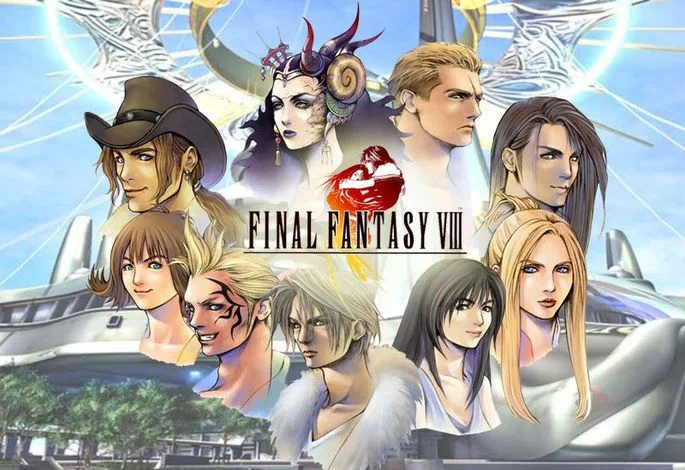
How to get Magic
Let’s talk a little more about how to obtain stocks of your magic spells. As previously stated, there are four main ways to do it:
- Drawing from enemies
- Refining crappy magic into better magic
- Modding Triple Triad cards (or items) into spells
- Using Draw Points
Drawing from enemies is the most obvious way, but it’s a pain. The number of spells you’ll draw on any given turn is partly random, and partly based on how high your Magic stat is. If it’s high, you’ll usually get five or more stocks in a single draw. If it is low, you will be lucky to get four (and if it is low enough, the Draw command may flat out fail).
But even if your Magic stat is high, it can take a while to fill up even a single spell, especially in the original version of the game where you can’t set battles to run at 3x speed. Between the load times before battle and the slow character animations, drawing 100 of a spell in a single battle can take a long, long time. Drawing 100 spells for all three characters in the party can take even longer. This is especially true if one of the characters has a low Magic stat. You may find two of your three party members fill up, and the third does not. That means you have to end the fight, transfer some of their magic to the third guy, and go back and draw some more. It’s tedious.
Of course, FF VIII pros will mock anyone who uses Draw as their main source of magic. They’ll tell you there are more efficient ways – though in my experience, they usually don’t tell you what they are. My guess is they are referring to the Card Mod ability (as well as multiple item mod abilities that turn items into spells). It is true that some cards can turn into tens (or even 100) of a given spell, but that only works if you have the cards in hand. That means you will have to go and play Triple Triad, which is easier said than done. The card-based minigame has all sorts of crazy rules that can spread or be abolished through every region of the game, and sometimes you have to spend a lot of effort just getting the rules to calibrate properly. Once you do, you then have to find the right opponent who happens to have the card(s) you need, and then beat them (because if you don’t, they’ll take your good cards, and you’ll have to reload a save).
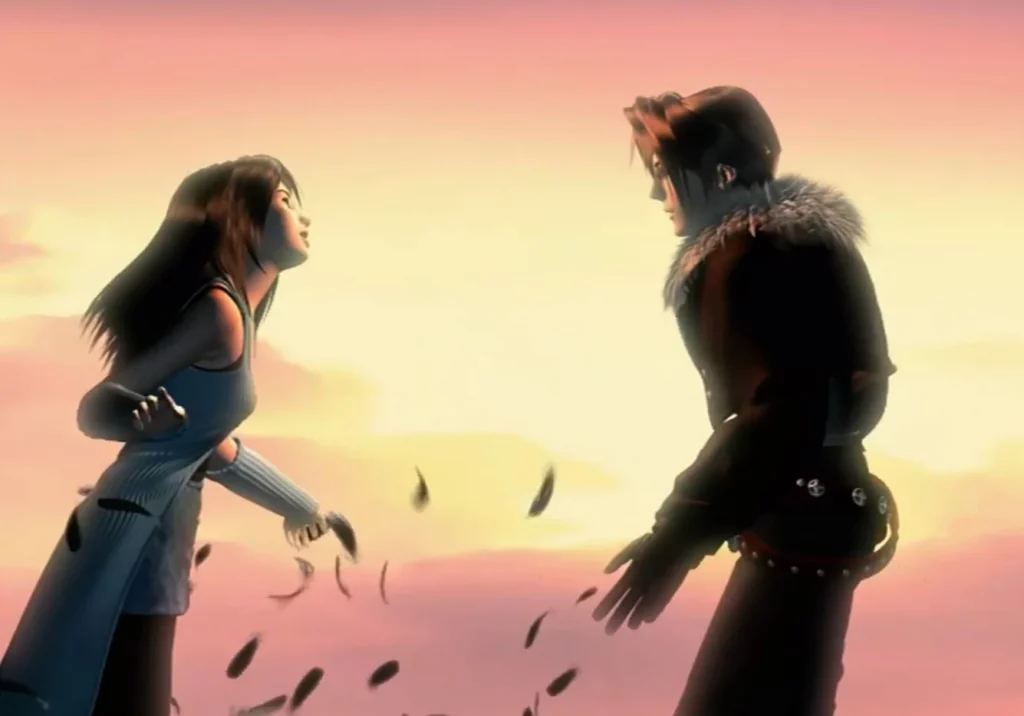
I am willing to believe that refining cards is “faster” compared to Drawing, but only relatively so. They’re both still going to take way too much time.
How to Stay Underleveled
As I mentioned before, enemies auto level with you. This behooves the player to try to level up as little as possible. If your low level party fights low level monsters, but your party is Junctioned with great magic, the stat boosts you’ll get from Junctioning will ensure that you wipe the floor with them. On the other hand, if you’re all high level, the enemies will gain access to more powerful spells that may wipe out whatever advantage you get from the Junction system.
But how, pray tell, does one stay underleveled? In the modern remaster of the game, you can turn off random battles at will, so no problem there. In the original game, your main options are:
- Run away
- Use a Guardian Force ability that disables random battles (which you’ll have to wait a while to obtain, and is easy to forget about)
- Use the Card ability
To be clear, Card is not the same as Card Mod. Card is a GF ability that can turn an enemy into its corresponding Triple Triad card. If you do this to all the enemies in a random battle, you’ll gain no XP, but you still gain the Ability Points that help GF’s learn abilities (such as the abilities that allow you to Junction to specific stats). This is the trick that allows you to Junction your low level party to high hell.
Unfortunately, only one GF learns Card, so only one person in your party can use it. Furthermore, the ability is quite flaky. Unless the enemy is much weaker than you, it probably won’t work if you don’t soften them up a bit. But be careful! If you’re Junctioned to high hell, it’s likely you’ll kill the enemy in one or two shots, in which case you’ll gain some of that dreaded XP.

Using Card to avoid XP in the base game is torture, and I wouldn’t suggest you try it. You’re better off just trying to minimize random battles as much as you can, while not avoiding them entirely . You can gain quite a few levels before enemies start to pack high level magic, so as long as you’re not grinding for XP, you’ll be fine. Then again, grinding for XP is a time honored tradition in jRPGs, and so I wouldn’t be surprised if a lot of people did that and painted themselves into a corner. It’s another way in which the game works against the player.
Tutorials
This is a big sticking point. Technically speaking, FF VIII has a bunch of tutorial content. Some of it is mandatory and unskippable, and some of it is hidden away in a series of menus.
A lot of FF VIII fans believe that the presence of these tutorials make all arguments against the game moot. They claim that everything you need to know about how the game works can be found in this content.
First, I disagree with that claim. No tutorial is going to teach you to use Card to avoid gaining XP. Some of the tips you need to succeed at the game lie not in understanding the underlying systems, but rather in esoteric ways of using those systems, and that’s not something tutorials typically cover.
Second, the mere presence of the tutorials is not sufficient. The game doesn’t really make it clear that there is tons of additional content hidden in the menus, so I can easily imagine lots of people skipping past them.
But also, are people seriously advocating that you should have to read through pages of text to understand how to play a mainstream jRPG? I mean, I have read through pages of text before playing a game. For example, I did that when I first played Rainbow Six. But that was a game that made it pretty clear that it was going for something very different from your usual First Person Shooter. FF VIII is not Rainbow Six.
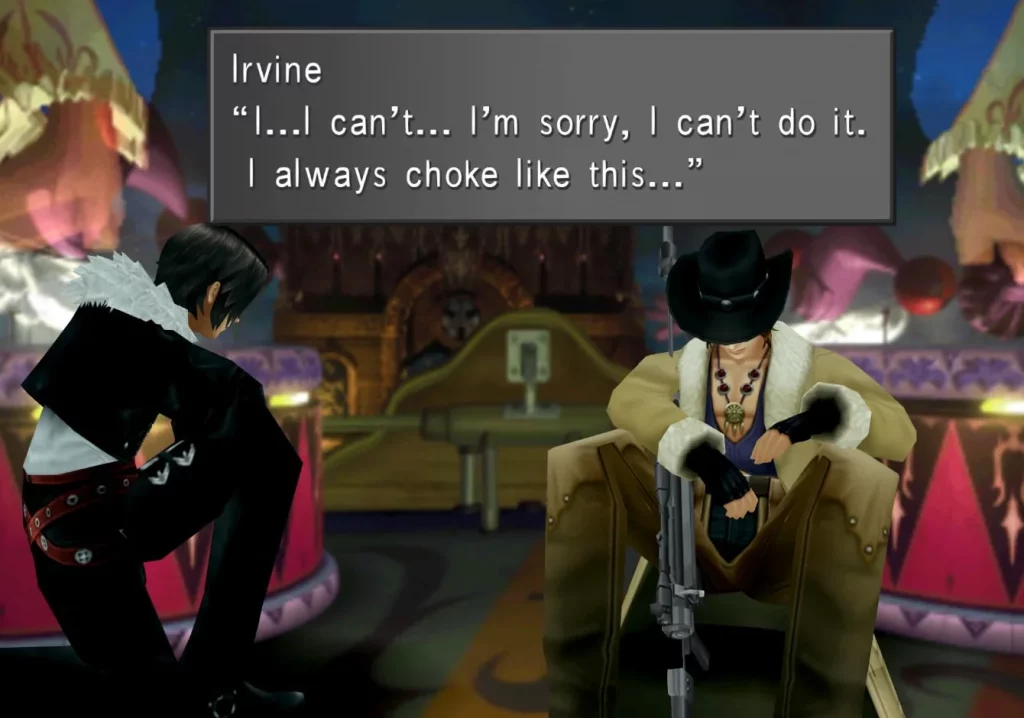
Lastly, I am of the opinion that some of the tutorials are garbage. For example, consider the early mandatory tutorial that teaches you how to Junction.
Or actually, let’s consider how a modern video game tutorial might work. Maybe you’re playing an open world game, and an early quest unlocks a Skill Point. Maybe the game then walks you through how to navigate to the Skill Menu and unlock an early ability. You now have that ability, and know how to unlock more.
If FF VIII were designed like a modern game, it might start you off with the ability to Junction to, say, your Attack stat, hand you 50 stocks of Blizzard, and then show you how to Junction them.
Instead, the tutorial is all hypothetical. It shows you how to Junction X stocks of some spell (I can’t recall which) to some stat (I can’t recall which), regardless of whether you have that spell (and at this point in the game, you almost certainly don’t have the ability to Junction to literally anything). It’s in no way based on the actual makeup of your party.
Suffice to say that this is extremely confusing. You might assume that the tutorial was real, and that your character is now properly Junctioned.But maybe you go into the menu to check, only to find out that you’re not. So you try to repeat what the tutorial shows you, only to discover that you can’t yet Junction to anything.
I can tell you from experience that this is incredibly jarring, confusing, and dispiriting. In my case, it caused me to give up on the Junction system during my first few attempts to beat the game. And why wouldn’t I? It didn’t seem to be working the way the tutorial showed me, and there was no clear reason as to why.
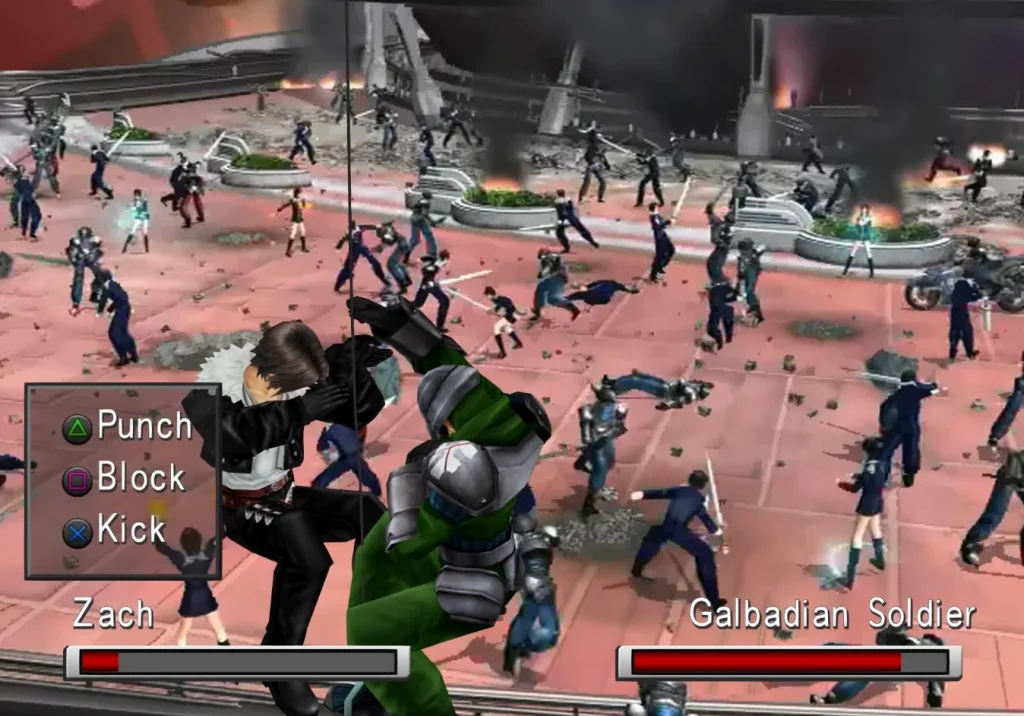
Guardian Force’s are a Dangerous Distraction
At the same time that the game is not teaching you how to embrace the Junction system, it is shoving GFs in your face. The game constantly talks about them, and even encourages you to use one of them (Shiva) to deal extra damage to the first boss (the GF Ifrit, who you then obtain).
Of course, once you use a GF, you realize that summoning it is awesome. You get to watch a cool cutscene, they deal a lot of damage, and when summoned they swap the character’s HP with their own.
On the surface, it seems like GF’s are the way to go, but they’re really not. Aside from the fact that they take too much time to use, their HP and attack strength can easily be eclipsed with good Junctions. They’re essential for making your characters strong through their abilities, but in battle they become a liability.
So we have a game with two options for combat, one of which is worse in the long term than the other. And yet early on, the game does everything it can to push you to the suboptimal choice.
This. Is. Not. Good. Design.
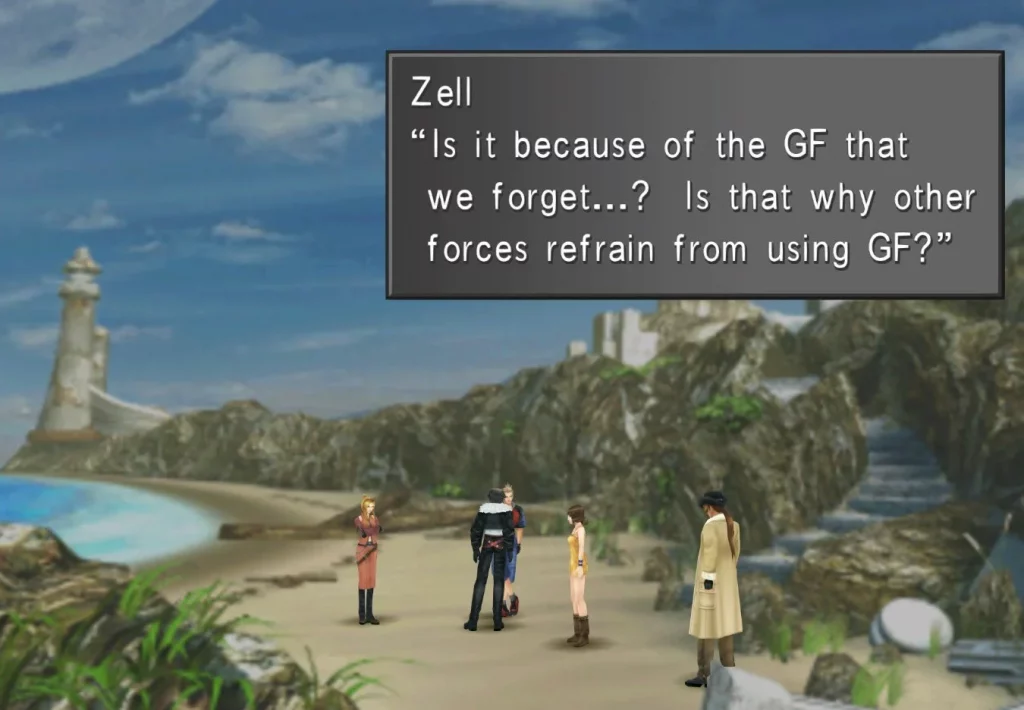
Party Management
The main party of FF VIII feature six characters, but you can only put three into battle at a time.
This is an important distinction, because the game is really built to only support three party members. For example:
- Getting three “full” sets of spells is relatively easy (and when I say “full”, I mean “100 stocks of all the best spells you can muster,” not “100 of every spell” – for whatever reason, no single character can carry all the unique spells in the game). Getting six full sets, on the other hand, is a huge chore. It’s clear to me that the game intends for you to do the former rather than the latter.
- As I mentioned in the last post, each single GF can only learn how to Junction to a limited number of stats. If you want each character to be able to Junction to all their stats, not only must you equip them with multiple GFs, but you must also equip very specific combinations of GFs that ensure that the “spread” of all stats is covered. And it just so happens that there are just enough GF’s that you can get this “all stat” spread on no more than three characters at a time.
This design has two consequences:
- You can’t really have all of your party members combat ready at all times. If you ever change active party members – and to be clear, there are times where the game will force you to – you’ll have to go into the menu system and do a Junction Exchange, which transfers all GF’s, spells, and Junctions from one person to another. It’s a pain in the butt, and you have to do it quite a bit.
- If you equip the party with one of the optimal combinations of GFs, what you end up with are three fixed character “classes.” In my case, I had one character who had strong attacks and decent HP, one with High Defense and high HP, and one with high Magic stats (which is still handy – even if you shouldn’t cast spells from your personal stock, you can also use the Draw system to cast spells directly on an enemy from their stock, so sometimes it’s handy to have a good Magic User). No matter which specific characters were in my party, they took on one of these three roles depending on the GF set I gave them. This essentially means that the individual characters can’t really be customized in any appreciable way. The only thing that distinguishes them is their Limit Breaks, and some of those are a lot better than others.
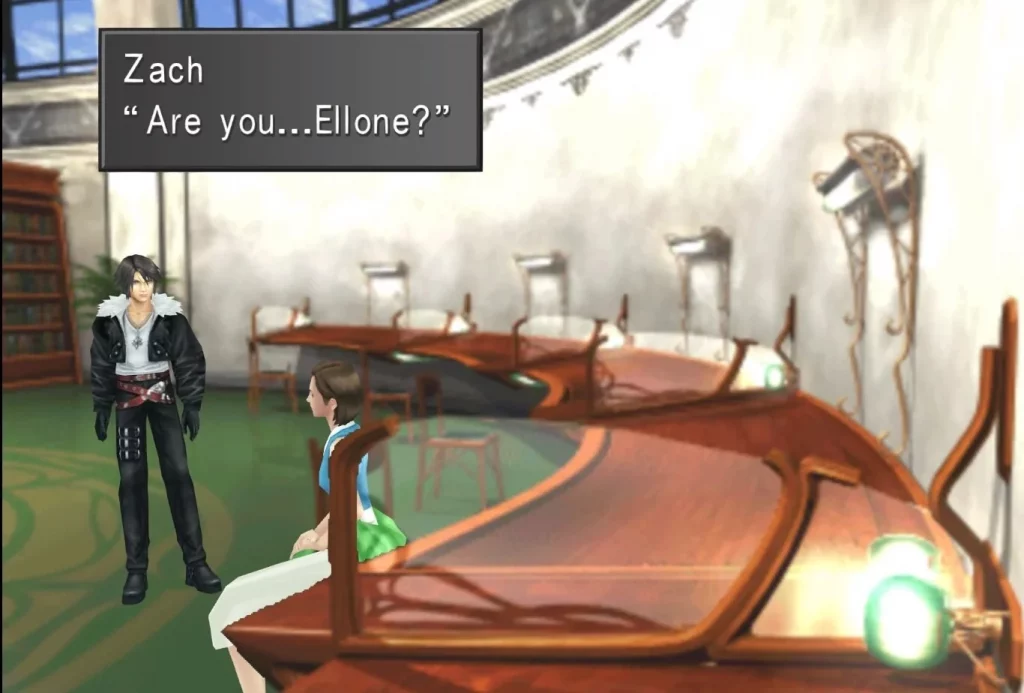
It’s weird. FF VIII is a game with multiple systems that allow for all sorts of crazy scenarios, and yet at the end of the day there are one or two optimal setups that largely play the same. What does it say when such a complex design boils down to having three fixed character classes?
Things that I liked
- I actually found that protagonist Squall is less of the emo edgelord than I remembered. For one, he’s actually pretty adept as a mercenary. More than anyone else on this team, he is capable of thinking on his feet and working well under pressure. As for his emo streak, as an adult it reads very differently to me. From early on it was clear that this was a kid with a lot of emotional trauma, someone who desperately wanted to connect to others, but was afraid to do so. I’m not saying he’s a great character, but at the very least he’s not the person he’s often stereotyped as being.
- I really like the weirdness of the game’s visual design. Every region is very distinct, and while none of it is cohesive, I appreciate just how wild the artists were willing to get.
- If you look for it, there is some backstory hidden in the game about a major war involving sorceresses, one which eventually led to certain technologies (like radio) being unusable (or was it that it was simply banned?). It’s interesting at a conceptual level, even if the game doesn’t do much with it.
Non-Systems Things that I Disliked
- I don’t like most of the game’s soundtrack. There are two songs that are among my all time favorite Final Fantasy tracks, but the rest range from unremarkable to downright painful. I don’t understand why people have such a love for Uetmatsu’s Playstation-era MIDI compositions.
- I can’t say either way, but this feels like a game where the English version loses a lot in translation. Some of the dialogue is awkward and nonsensical.
- There are way too many secrets and hidden things in this game, and a lot of it is super easy to miss. I’m talking “you can only get this item immediately after Scene A occurs, and only if you walk in the opposite direction of where you are supposed to go” stuff. I feel like this kind of nonsense was commonplace in the Playstation era, as a way to give veteran jRPG fans from Japan a real challenge. I still contend that it’s a way to waste everyone’s time.
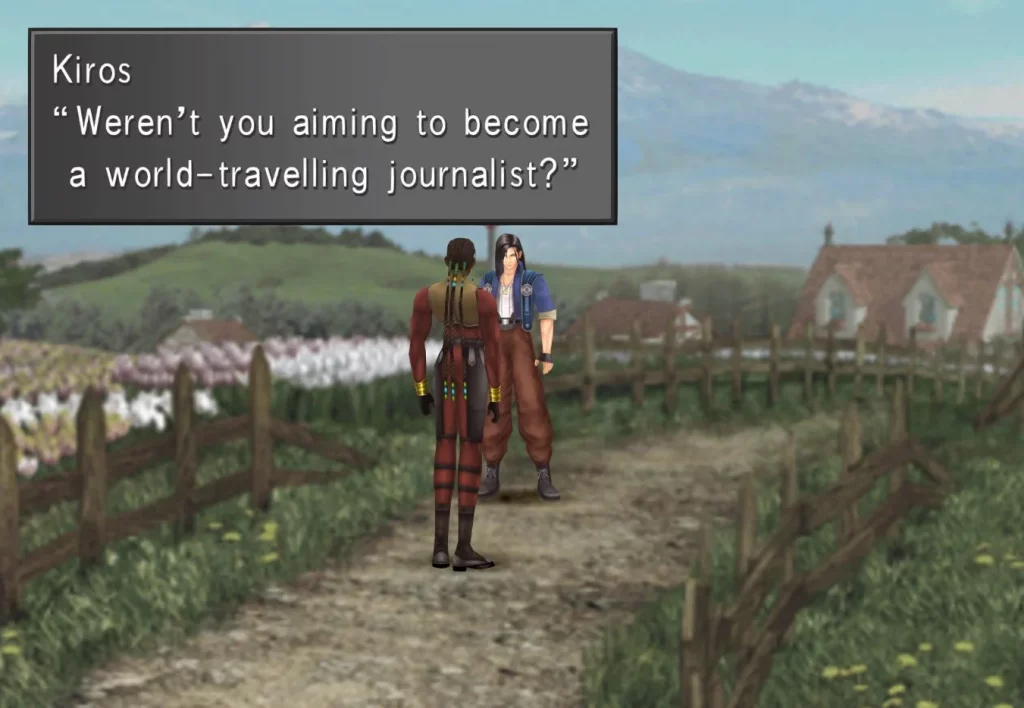
Conclusion
Like I said, I don’t have an overarching point to make with this post, though I will say the fact that I spent most of the last post, and most of this one describing the intricacies of the combat and magic and leveling systems is a bit crazy. Put it this way – I’ve written software development tutorials in fewer words than this. It all just a bit much.


[…] VIII (that I never intended to be a 3 Part series about Final Fantasy VIII – Part 1 here and Part 2 here), I want to go into a bit more detail about my personal history with this game. I fully admit that […]